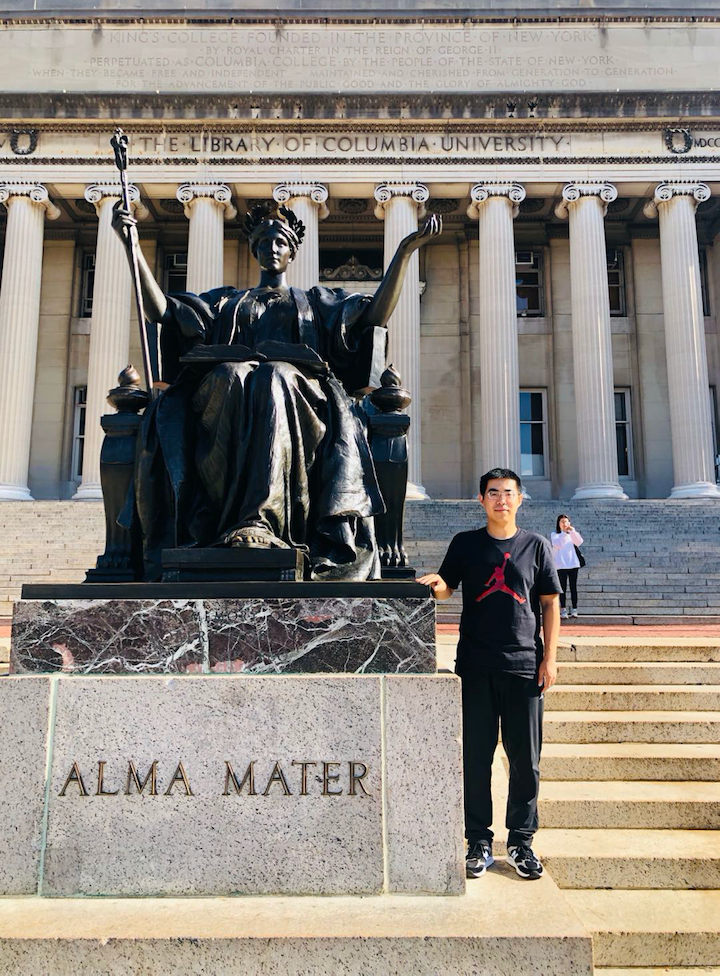A doctoral student at the School of Finance at Renmin University of China and a member of the China Institute for Income Distribution (CIID) at Beijing Normal University, Pengzhan Yang was a visiting scholar at the China Center for Social Policy in 2019–2020. He offers a few reminiscences from the year.

From Beijing to New York City
I first met Professor Qin Gao in October 2018 at the thirtieth-anniversary celebration of the International Forum on Income Distribution and China Household Income Project (CHIP). I participated in the research and data cleaning of CHIP2018, and my research interests are income distribution, social policies, and rural old-age insurance, which cross-cut with Professor Gao's research. I was inspired by Professor Gao's book Welfare, Work, and Poverty: Social Assistance in China and deeply impressed by her research on the evaluation of the effectiveness of China's Dibao [minimum guaranteed livelihood] program.
I was thrilled when Professor Gao invited me to become a visiting scholar at the China Center for Social Policy for the upcoming year. New York City is a cultural wonderland, a source of inspiration, and a testing ground for everyone in the world. I applied for a grant from the Chinese Scholarship Council to support my stay at Columbia University from September 2019 to August 2020.
Expanding My Intellectual Horizons
My main research project during the visit focused on the effects of public transfers on income distribution and poverty in China. When I arrived in New York in August, Professor Gao was preparing for an October forum called “Urbanization and China: Understanding Impacts, Projecting Future.” I was invited to contribute to a report titled “Urban Poverty in China: Driving Forces and Coping Policies,” which studied the status and trends of urban poverty and discussed the different poverty lines.
During the annual lecture, “Income and Wealth Distribution in China” hosted by the China Center for Social Policy that same month, I learned a great deal and built up my confidence to carry out my own research. I also attended Professor Gao’s class in Global Social Policy and wrote a final paper, “Housing Crisis: Behind High Housing Prices in Urban China—A Proposal for the Shared Home Ownership Program,” with a group of my fellow students. The class helped to broaden my perspective to include other countries, and the paper-writing exercise gave me a sense of what collaborative research entails.
In the spring semester, I was fortunate to participate in University Professor Joseph E. Stiglitz’s Economic Perspective course. Having a chance to learn from a famous economist and the recipient of the 2001 Nobel Memorial Prize in Economic Sciences was one of the greatest experiences of my stay at Columbia. His course took my understanding of the nature, extent, and consequences of global inequality to a new level.
Another highlight was the China Center’s training workshop, “Conducting Qualitative Research,” held in February 2020. At this workshop, Dr. Shu-jung Li and Dr. Jun Lu drew from their own research experiences in explaining how to conduct field work, in-depth interviews, and text analysis. This workshop gave me a whole new perspective, and I found it an interesting challenge to analyze problems qualitatively.
In my last few months in New York City, Professor Gao invited me to participate in a UNICEF-sponsored project called “Social Protection for Children in China.” I processed the micro-database of CHIP2018, conducted relevant tests on child poverty, and examined Dibao’s effect on the multidimensional poverty of children in China using propensity-score matching. The project allowed me to gain advanced tools and gave me the confidence for conducting an empirical study on my own.
COVID-19 in New York City
In March 2020, COVID-19 broke out in the United States, and New York became the epicenter of the virus, with more confirmed cases than had been experienced by the rest of the world at that point. Many faculty and staff followed New York State’s lockdown guidelines and worked from home. The remaining sessions for second-semester courses had to be held online through Zoom, which was a new experience for me and many others.
Anxiety and tension circulated in every corner of New York City, and the nature of daily life changed rather dramatically. In the beginning, we were very scared, washing hands carefully every day, not daring to go out, and buying food online. Being closed in at home made me very anxious. However, in June, the situation in New York City began to improve, and the entire city began to reopen.
During the pandemic, I learned how to be alone and how to cope with the emotions generated when facing a health threat of this scale. I believe living through COVID-19 in New York equipped me with the patience, willpower, courage, and life skills to face future challenges. I actually learned how to cook!
The Many Gifts of CSSW
Looking back on my visit, I can see that Columbia gave me many gifts. I expect I will recommence my PhD journey back home in Beijing with renewed determination and energy, and with the benefit of fresh ideas. I really appreciate the help and guidance provided by Professor Gao, who has generously shared her knowledge and her contacts. Her academic rigor and enthusiasm for work have deeply affected me. I look forward to continuing my collaboration with her and the rest of my Columbia network upon my return to Beijing.
Pengzhan Yang is a doctoral student at the School of Finance in Renmin University of China and a visiting scholar at CSSW from September 2019 to August 2020. His major is public finance. His current research focuses on income distribution, social policies, and rural old-age insurance in China. He is also a member of the China Institute for Income Distribution (CIID) at Beijing Normal University.